 W
WThe political systems of Imperial China can be divided into a central political system, a local political system, and a system for the selection of officials. There were three major tendencies in the history of the Chinese political system: the escalation of centralisation, the escalation of absolute monarchy, and the standardisation of the selection of officials. Moreover, there are the ancient supervision system and the political systems created by ethnic minorities, as well as other critical political systems which may be mentioned.
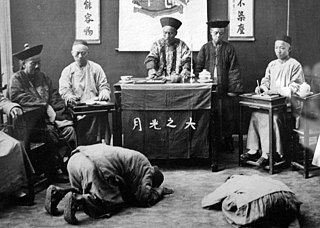 W
WCounty magistrate sometimes called local magistrate, in imperial China was the official in charge of the xian, or county, the lowest level of central government. The magistrate was the official who had face-to-face relations with the people and administered all aspects of government on behalf of the emperor. Because he was expected to rule in a disciplined but caring way and because the people were expected to obey, the county magistrate was informally known as the Fumu Guan, the "Father and Mother" or "parental" official.
 W
WEmperor of China was the title given to the monarch of China during the Imperial Period of Chinese history. In traditional Chinese political theory, the emperor was considered the Son of Heaven and the autocrat of All under Heaven. Under the Han dynasty, Confucianism replaced Legalism as the official political theory and succession theoretically followed agnatic primogeniture. The Chinese emperors who shared the same family were classified into historical periods known as dynasties.
 W
WThe Grand Council or Junji Chu, officially the Banli Junji Shiwu Chu, was an important policy-making body of China during the Qing dynasty. It was established in 1733 by the Yongzheng Emperor. The Council was originally in charge of military affairs, but gradually attained a more important role and eventually attained the role of a privy council, eclipsing the Grand Secretariat in function and importance, which is why it has become known as the "Grand Council" in English.
 W
WThe Han dynasty of ancient China was the second imperial dynasty of China, following the Qin dynasty. It was divided into the periods of Former Han and Later Han, briefly interrupted by the Xin dynasty of Wang Mang. The capital of Western Han was Chang'an, and the capital of Eastern Han was Luoyang. The emperor headed the government, promulgating all written laws, serving as commander-in-chief of the armed forces, and presiding as the chief executive official. He appointed all government officials who earned a salary of 600 bushels of grain or more with the help of advisors who reviewed each nominee. The empress dowager could either be the emperor's actual or symbolic mother, and was in practice more powerful than the emperor, as she could override his decisions. The emperor's executive powers could also be practiced by any official upon whom he bestowed the Staff of Authority. These powers included the right to execute criminals without the imperial court's permission.
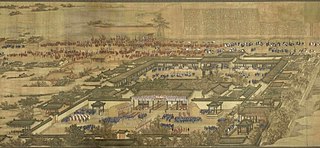 W
WThe Hanlin Academy was an academic and administrative institution founded in the eighth-century Tang China by Emperor Xuanzong in Chang'an.
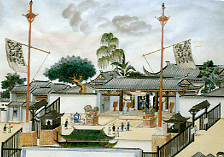 W
WHoppo or Administrator of the Canton Customs (t 粵海關部, s 粤海关部, p Yuèhǎi Guānbù;), was the Qing dynasty official at Guangzhou (Canton) given responsibility by the emperor for controlling shipping, collecting tariffs, and maintaining order among traders in and around the Pearl River Delta from 1685 to 1904.
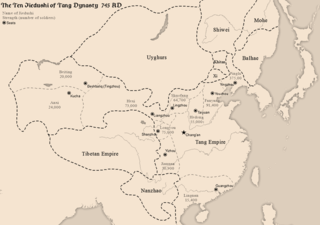 W
WThe jiedushi were regional military governors in China during the Tang dynasty and the Five Dynasties and Ten Kingdoms period. The post of jiedushi has been translated as "military commissioner", "legate", or "regional commander". Originally introduced in 711 to counter external threats, the jiedushi were posts authorized with the supervision of a defense command often encompassing several prefectures, the ability to maintain their own armies, collect taxes and promote and appoint subordinates.
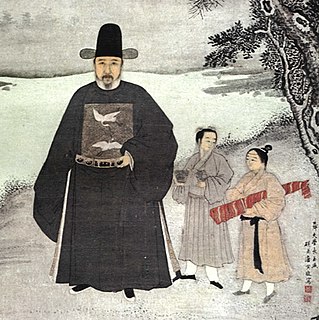 W
WA mandarin was a bureaucrat scholar in the history of China, Korea and Vietnam.
 W
WScholar-officials, also known as literati, scholar-gentlemen or scholar-bureaucrats were politicians and government officials appointed by the emperor of China to perform day-to-day political duties from the Han dynasty to the end of the Qing dynasty in 1912, China's last imperial dynasty. After the Sui dynasty these officials mostly came from the scholar-gentry who had earned academic degrees by passing the imperial examinations. The scholar-officials were schooled in calligraphy and Confucian texts. They dominated the government and local life of China until the early-20th century.
 W
WWen Yanbo, courtesy name Kuanfu, was a scholar-official of the Song dynasty who served four emperors over more than five decades. He was a grand councilor during Emperor Renzong's reign.